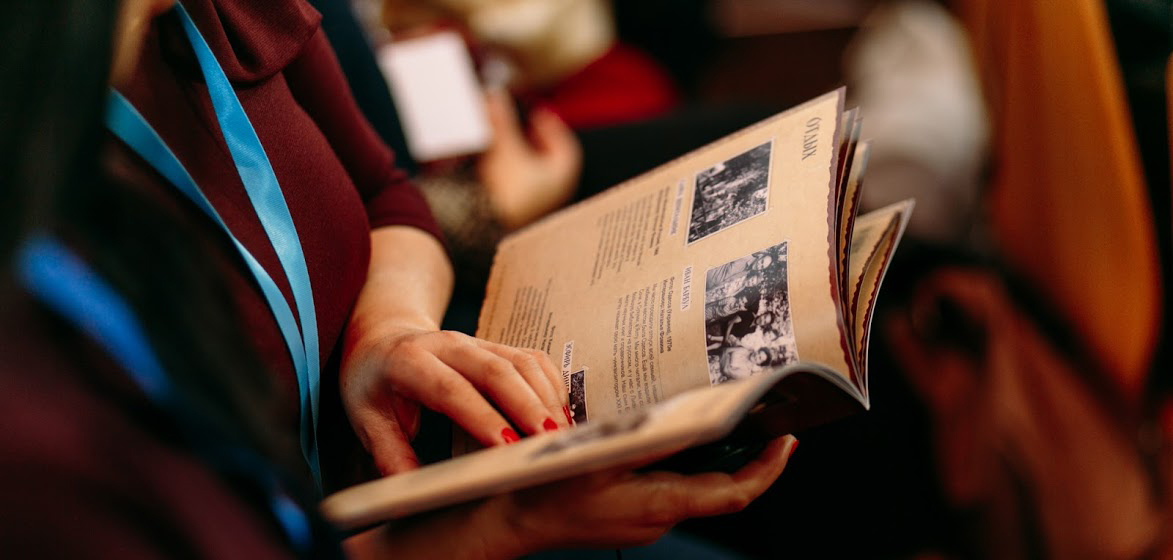Quotes
Antisemitism is a phenomenon with many dimensions and deep roots in European societies, including Greece. The interviews conducted by the Jewish Museum of Greece within the framework of the HANNAH project sought to give a voice to the people who have or may have been victims of antisemitism, to listen to their stories and to record their experiences – not as passive victims, but as active agents. We were interested in understanding if and how they could, and ultimately how they did, react to various form of antisemitism. Our goal was to understand how they experienced antisemitism within the context of their entire lives. At the same time, the project aimed to document incidents of antisemitism in Greece that may have gone unnoticed in the academic literature.
In this context, the Jewish Museum of Greece designed a multifaceted oral history programme, which was implemented from June to October 2021. A total of 25 interviews with Greek Jews – 9 men and 16 women – were conducted in Athens, Chalkida, Thessaloniki, Corinthia, Larissa, Ioannina and Corfu, resulting in just over 50 hours of interviews. The type of interviews was that of a “life interview”, i.e. we asked them to narrate their life stories. We thank them warmly for responding and for sharing their experiences with us.
Our main objective was to understand the evolution of contemporary antisemitism as it has evolved since the end of the Holocaust and World War II. Therefore, we initially aimed at gathering narratives from that age group called “second-generation Holocaust survivors”, i.e. children born after the war to Jewish parents who had suffered persecution. These children were themselves the actual proof and hope that the destroyed Jewish communities of Greece could be reborn. The stages of their lives coincided with the reconstruction of the Jewish communities in Greece.
Given that the number of interviews was limited, we set two further criteria for the profile of the interviewees. One is that we gave priority to collecting interviews from children of survivors of the Nazi camps in order to explore the intergenerational trauma and family memory of the Holocaust. The second was that we sought out people who have been involved in Greek Jewish communal issues, because we were particularly interested in talking to people who have been systematically active in the visibility of Greek Jewry in contemporary times and hearing about any obstacles they may have faced.
In the course of our research, we eventually included some testimonies from different age groups. We have three interviews with people who were born before the war and have personal memories of the period of persecution and the peak of antisemitism. The oldest interviewee in this group was born in 1929. In these interviews we focused on their lives after the war; however, they also talked about their wartime experiences that showed how the experience of persecution shaped their postwar lives. In addition, we conducted two interviews with people belonging to the “1.5 Holocaust generation”, those who were born while the persecution was still ongoing during World War II. These are people whose birth at the critical moment of the destruction of their community left them with many questions about their early years, which they sought to answer as they grew older. In the end, the inclusion of other age categories in the project has been extremely beneficial to its outcome. The researcher can look across many different testimonies and understand how various age groups speak differently about antisemitism.
A small sample of these life stories can be seen here. All the interviews are the property of the Jewish Museum of Greece and are accessible strictly for research or educational purposes with full respect for the regulations on the safeguarding of sensitive personal data based on EU directives and national legislation. A full list of the interviews, with small quotes from each one, follows.
All HANNAH oral testimonies of Greek interviewees can be freely accessed at the Jewish Museum of Greece upon request at [email protected].
Interviewer: Dr Eleni Kouki (researcher), Dimitris Polydoropoulos (filmmaker)
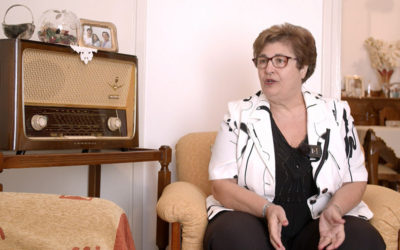
Short Bio
Nina Battinou was born in Ioannina in 1947. Both her parents, Israel and Janet, survived Auschwitz-Birkenau death camp. She is one of the first children to have been born after the Holocaust and the destruction of the Jewish community of Ioannina. In her interview she talks about how she grew up listening to the stories from the camp, the nightmares she had, as well as some issues she had with her Christian classmates at school.
Quote
Another thing I remember from my childhood was asking my parents why I didn’t have grandparents. All the children of the same age had grandparents. […] We didn’t have any. […] And when I went to school, the teacher asked us to write about our family. And my essay was simply a complaint that I didn’t have a grandparent.
Info Fields
Last Name: Battinou
First Name: Nina
Date of Interview: 10/10/2021
Place of Interview: Ioannina
Project Contributors: Eleni Kouki / Dimitris Polydoropoulos
Short Bio
Alina Moissi was born in Larissa in 1968. Esdra Moissi, her father, had joined the Resistance movement during the German Occupation and after the war he worked extensively as a writer and a journalist to promote the memory of the Holocaust and to combat antisemitism. Alina herself is currently the Director of the Jewish community of Larissa. In the interview she talks about her life, her childhood, how she developed an interest in the community issues, and she shares with us some incidents of antisemitism and how she dealt with them.
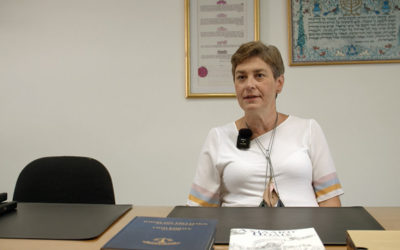
Quote
There was a family that lived in the same apartment building with us; there were two little girls in it. They used to go around and sing all the carols of the season. I was very jealous of carols because as a Jew I didn’t sing them. […] Suddenly there was a knock on the door on Holy Thursday. Do you know the Holy Thursday carols? “The unrighteous Jews crucified Christ. The lawless and the dogs, the cursed.” My mother knew these carols. She opened the door and they said “Shall we sing them?” We were family friends and we played with the kids. And mom says, “No, don’t sing them, girls. Take some change, don’t sing the carols for me and go and tell your mother that I did not want you to sing them for me.” I should point out that both their parents were teachers.
Info Fields
Last Name: Moissi
First Name: Alina
Date of Interview: 28/9/2021
Place of Interview: Larissa
Project Contributors: Eleni Kouki / Dimitris Polydoropoulos

Short Bio
Delia Alchanati was born in Athens. From the early 2000 she was active in the community affairs, starting with the School Committee of the Jewish school in Athens. Today she is the General Secretary of the Jewish Community of Athens, the only woman in Greece to date who has been elected to this position. She is currently collecting data and writing a book about her father, Daniel Alchanati, who was active in the Resistance during the WWII and was later elected President of the Jewish Community of Athens.
Quote
I cannot say that when I was a child someone said something to me that hurt me […]. We always played in Amerikis Square with all the kids … Not even when I was older and went to high school […]. Although we knew that there was some antisemitism, that some stereotypes were going around and, unfortunately, they are still circulating […] The good thing is that from going to [Jewish] school we were very proud of who we were, we learned to respect difference and so, even if they said something to us, […] we had an answer. We have always felt pride in who we are […]. Very simply because we lived it.
Info Fields
Last Name: Alchanati
First Name: Delia
Date of Interview: 6/7/2021
Place of Interview: Athens
Project Contributors: Eleni Kouki / Dimitris Polydoropoulos
Short Bio
Sammy Varsano was born in Thessaloniki. His father was an Auschwitz survivor. When he grew up, he took over the family business. In 2012, together with journalist Pano Baili, he wrote the novel Saulico based on his father’s story. In the interview, he talks about the intergenerational trauma, hidden antisemitism and the evolution of memory culture of the Holocaust.

Quote
Some aspects of my childhood were uncomfortable […] especially in the period when there was compulsory church attendance and religion was pervasive in school, much more than it is today […]. It wasn’t something tragic; it was just uncomfortable for a child who, when the rest of the class went to church, had to stand up and say “I won’t be coming because I’m Jewish” […]. I went to the 40th Ioannideio school; it’s an old Thessaloniki school, one of the best primary schools. There of course I had a traumatic experience […] which I remember very well. I recall little from that period, but I remember this image […]: in the toilets the floor was [paved] with slabs from Jewish tombs and it was a traumatic experience for me. And it remains so, since I found out how those slabs got there.
Info Fields
Last Name: Varsano
First Name: Sammy
Date of Interview: 27/9/2021
Place of Interview: Thessaloniki
Project Contributors: Eleni Kouki / Dimitris Polydoropoulos
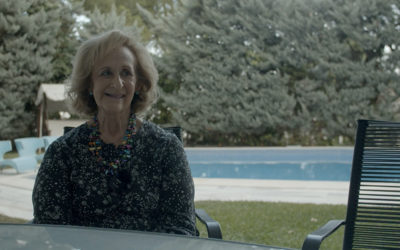
Short Bio
Rita Ventoura was born in 1958. Her mother was Berry Nachmias, an Auschwitz survivor from Kastoria who in the 1990s was active in promoting the memory of the Holocaust in Greece. Rita grew up in Athens and studied psychology. Her dissertation was on the psychological effects on second generation Holocaust survivors.
Quote
My mom was a great storyteller, and she mesmerised us with her fairy tales […]. When I was 11 or 12 years old, she told me […] about Nazism and the Holocaust, her own story. She told such a scary story in a magical, dynamic way. And a positive way. […] It did not scare me. […] It did not have a message of like, “oh, it was nothing”. She had her pain, grave pain. On the other hand, she took some comfort in the knowledge that she was saved and would continue the tradition.
Info Fields
Last Name: Ventoura
First Name: Rita
Date of Interview: 3/7/2021
Place of Interview: Athens
Project Contributors: Eleni Kouki / Dimitris Polydoropoulos
Short Bio
Nina Vital was born in Corfu in 1956, the daughter of Samuel, one of the few Jews of Corfu to have survived Auschwitz. In the interview, she talks about her childhood, her coming of age and her political activism and shares her thoughts on the reconstruction of the island’s Jewish community.
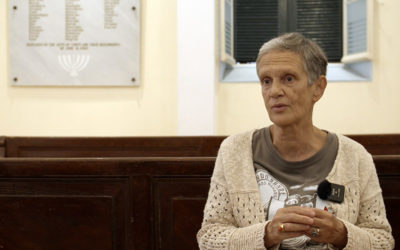
Quote
The only [problem] I remember [from school] that bothered me was when they said, “The Jews crucified Christ.” And I felt bad, and I said, come on, but did all Jews do it, I didn’t do anything. […] I stood up and asked: “Sorry, but why did this happen? Was it only the Jews who crucified Christ? Weren’t the Romans also there?” “Yes, yes,” a hasty answer [from the teacher], “that’s what the books say … That’s how we found them; don’t be sad.” But, okay, this didn’t weigh me down too much because I maintained a distance from all these things…
Info Fields
Last Name: Vital
First Name: Nina
Date of Interview: 11/10/2021
Place of Interview: Corfu
Project Contributors: Eleni Kouki / Dimitris Polydoropoulos

Short Bio
Nathan Giechaskiel was born in Larissa in 1950, in his mother’s hometown, but he grew up in Thessaloniki in the area where the Jewish quarter “151” was located before the war. His father, Baruch, was an Auschwitz survivor. In the interview, Nathan recounts his father’s struggle to rebuild his life after the war and start a family having lost his first family in Auschwitz. He talks about the silence that prevailed at home for his father’s first family, but also about the contemporary manifestations of antisemitism in Greece.
Quote
My father came back from the war, a wreck of course – and who wasn’t a wreck? – and he was trying to rebuild his life. […] He turned a new page. He shut out the past, and maybe that’s why he didn’t want to tell us anything. For years. Of course, I was growing up, I was a child, my father came, he brought us shopping, we did the Sabbath at home. We lived well. But I could not imagine his misery. He was in pain a lot, but he said it was due to frostbites from the war.
Info Fields
Last Name: Giechaskiel
First Name: Nathan
Date of Interview: 27/9/2021
Place of Interview: Thessaloniki
Project Contributors: Eleni Kouki / Dimitris Polydoropoulos
Short Bio
Joya Eliakeim was born in Chalkida in 1966. Her father, Moissis Eliakeim was an Auschwitz survivor. Joyia tells us about her life in Chalkida, her memories of the community life in the 1970s and 1980s, and shares some of the antisemitic events that targeted her.

Quote
When I see 250 children not knowing what the Holocaust is, it tells me that history can be repeated. […] In the 2nd high school my son gave a talk [about the Holocaust]. My son demanded to see the school principal. […] Some people at the school were scared, from what I see. They want to make things softer. They were afraid of the parents’ reaction. […] During the talk, the children were dumbstruck. Which means they wanted to hear about it.
Info Fields
Last Name: Eliakeim
First Name: Joya/Jenny
Date of Interview: 28/7/2021
Place of Interview: Chalkida
Project Contributors: Eleni Kouki / Dimitris Polydoropoulos
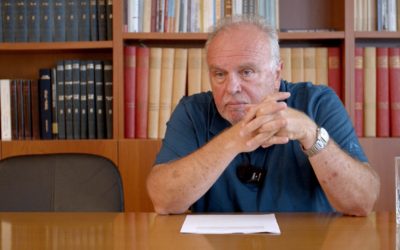
Short Bio
Victor Eliezer was born in Athens in 1960. He studied politcial science and itnernational relations in Israel and then he took over the family business. He also worked as a journalist and a correspondent for Israeli newspapers. From an early age he showed an interest in the community life and worked on community issues from various positions. Today he is the General Secretary of Central Board of the Jewish Communities of Greece (KISE). In this interview he talks about his family, his life, and shares his thoughts on reconstructing Jewish communities after the war, but also on tackling antisemitism.
Quote
[In the army] a sergeant thought I was a Jehovah’s Witness. […] So, the next morning after the report, I requested a meeting with the commander. I said to the commander, ‘Sir, I’m not a Jehovah’s Witness, but even if I were, I would not accept this discrimination. I happen to be a Jew, and because you now know that I am a Jew, I will tell you that I will not tolerate any discriminatory behaviour against me. […] Because if this happens, not only will the Ministry of Education know the next day but the whole world will know.” Because I was already a journalist at that point.
Info Fields
Last Name: Eliezer
First Name: Victor
Date of Interview: 9/7/2021 (Part A), 2/9/2021 (Part B)
Place of Interview: Athens
Project Contributors: Eleni Kouki / Dimitris Polydoropoulos
Short Bio
Moissis Elissaf was born in 1954 and grew up in Ioannina. He studied at the Medical School of Athens and from an early age became active in communal affairs. In 2019 he was elected Mayor of Ioannina, the first Jewish mayor in Greece. In his interview he talks about his life, his political activities, his thoughts on the evolution of the Jewish community of Ioannina, and he analyzes in detail how the Jewish cemetery of Ionnina was vandalized over and over again.
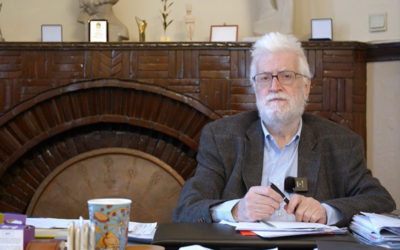
Quote
In the run-up to the [2019 municipal] elections, someone said “We will not elect a Jewish mayor”. Someone else said that he [Elissaf] would enslave everyone to foreigners, he would be elected by foreign embassies. Various things were said. Let me recount one incident that I remember. […] It was between the first and second Sunday [the first and second round of voting]. I was running against my predecessor. Our families knew one another, we knew each other since early childhood […] We had our final speeches. […] He did it here in his office [inside the town hall]. So, he took the icon of the Virgin Mary […] and put it right behind him and the frame, the lens, was on Virgin Mary. This was the choice of his PR staff. It angered many democratic citizens. […] They didn’t succeed.
Info Fields
Last Name: Elissaf
First Name: Moissis
Date of Interview: 10/10/2021
Place of Interview: Ioannina
Project Contributors: Eleni Kouki / Dimitris Polydoropoulos

Short Bio
Haim Ischakis was born in Athens in 1959, the second son of Daniel Ischakis, an Auschwitz survivor from Ioannina, and Zimboula Ischaki from Chalkida. In his interview, he talks about his father’s struggle to rebuild his life after the war, his childhood, his studies and his professional activities. Today, Haim is a cantor and travels all over Greece to perform religious services.
Quote
[My father], the older he became the more he realised that he hadn’t much more time left on earth, [the more] he opened up. Additionally, something else that played a role is that in 1994 a Holocaust memorial was erected in Ioannina, where my mother took him with great difficulty. He wasn’t able to get onto the bus; five people had to carry him on. It was his last trip. […] He was shocked; he saw a lot of people he hadn’t seen since 1945. […] There is a tape, I have it, where he cries bitterly. […] After this trip he wanted to talk.
Info Fields
Last Name: Ischakis
First Name: Haim Victor
Date of Interview: 19/7/2021
Place of Interview: Athens
Project Contributors: Eleni Kouki / Dimitris Polydoropoulos
Short Bio
The fourth daughter of Auschwitz survivors, Heinz and Selly Kunio, Reggina was born in Thessaloniki in 1967. She has been involved in various Holocaust remembrance projects. In the interview she talks about her life, the impact that her family history had on her personality, and shares some antisemitic incidents that she encountered, as well as the way she dealt with them.
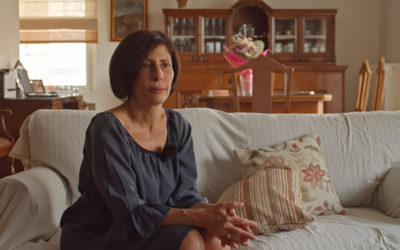
Quote
I think antisemitism has not changed. I have changed and I can realise things around me better and I have my eyes open. […] I have experienced many incidents. On the bus in Thessaloniki. They were two men. I had just finished high school. […] And I was with a friend of mine and we were going to Peraia. […] The bus was very crowded. And there are two men behind us, old people, who saw something, the military airport, and one said something about the Americans, the usual, the conspiracies, and “yes, the Jews do everything and fair play to Hitler, pity he didn’t kill them all.” […] I turned and told him: “Why do you say that?” [He responded] “What do you want and do you get involved in the conversation?” And my girlfriend, poor thing, did not know where to hide. […] People standing were looking at us and at them. […] And I said, “why do I say that? It’s like telling me that it’s too bad that I’m alive and that my dad shouldn’t have survived.” “Why,” he tells me, “what are you? Are you Jewish?” And I say, “Absolutely.” And his friend was telling him, “stop, stop”. And my friend tells me to stop. And when he saw that I was a Jew, he stopped: “Well, I didn’t mean you…,” he said.
Info Fields
Last Name: Kunio
First Name: Reggina
Date of Interview: 3/8/2021
Place of Interview: Athens
Project Contributors: Eleni Kouki / Dimitris Polydoropoulos

Short Bio
Hella Kunio-Matalon was born in 1961 in Thessaloniki to the daughter of Heinz Kunio, an Auschwitz survivor who later worked hard to gather information about the Holocaust in Thessaloniki and the destruction of the city’s Jewish community. In the interview she talks about Thessaloniki from her childhood and the way she learned about the Holocaust from her family.
Quote
From a very early age, from ten or eleven, I was fully aware of what my father had suffered. […] In the museum [Jewish Museum of Thessaloniki] we have a showcase in the Holocaust hall. It contains many small things. All from our house. That is, in our house we had something like an aquarium, one metre by a half a metre, in which my dad had put some things of his own that he had brought from the camp, including his diary […] and some other small things which he had picked up himself from the camp when he visited in 1960 when it was abandoned, it was not a museum like it is today. […] Inevitably, then, a child asks questions. […] And either you have the power to answer with the truth or you have to tell lies. Well, they did not lie to us.
Info Fields
Last Name: Kunio-Matalon
First Name: Hella
Date of Interview: 27/9/2021
Place of Interview: Thessaloniki
Project Contributors: Eleni Kouki / Dimitris Polydoropoulos
Short Bio
Betty Magrizou was born in Thessaloniki in 1957, the daughter of the Auschwitz survivor, Joseph Magrizos. In the interview she talks about her father’s silence, the hopes of the post-war generation, but also her personal research and writing work in relation to the Holocaust.
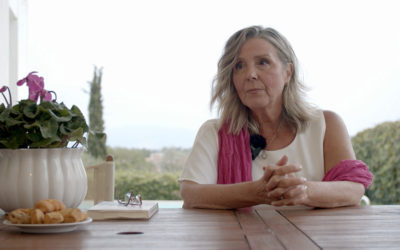
Quote
My first reader [of her book [The Bracelet of Fire] [were] my mother and my daughter. My mom is very proud. And do you know what she said? I lived with my husband for so many years, and there was so much pain, and only by reading your book did I understand what he had gone through. I should have been hugging him, kissing him, telling him: you went through so much… Maybe my dad did not want to upset her and did not tell her… […] And I believe that this is the power of the book. Even the one who lived it, my mom who had her husband next to her, to learn the story, to experience it through the book.
Info Fields
Last Name: Magrizou
First Name: Betty
Date of Interview: 29/9/2021
Place of Interview: Larissa
Project Contributors: Eleni Kouki / Dimitris Polydoropoulos
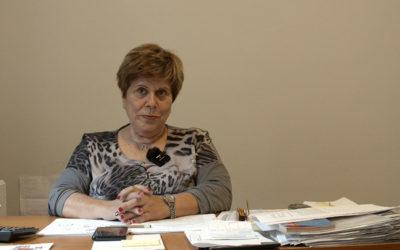
Short Bio
Anna Matathia is the fourth child of Gershom and Stella Matathia. Both of her parents were Auschwitz survivors. In our interview she talks about her life in Corfu, her love for music, and her contribution to the community.
Quote
So, we were born after the three children that my father lost [at Auschwitz]. Their names were Roza, Liza and Anna. Roza was his eldest daughter and he talked about her constantly. She was eight or nine years old then, in the camps, and disappeared the first night. And his [first] wife and his [other two] children. And that’s what he talked about. He spoke to me, of course, but not too early; when I got older and we became very close. My older sisters were gone, they were married, and my brother was a soldier. And I was the only one at home for a while, for two or three years. And so, it was then that he spoke to me for the first time, that he opened up to me.
Info Fields
Last Name: Matathia
First Name: Anna
Date of Interview: 11/10/2021
Place of Interview: Corfu
Project Contributors: Eleni Kouki / Dimitris Polydoropoulos
Short Bio
Anna Mizan was born in Athens in 1966. Her father Isaac from Arta was an Auschwitz survivor and in the last decades of his life he was very active in promoting the memory of the Holocaust. Anna explains how she started learning about the Holocaust and how she supported her father’s work.
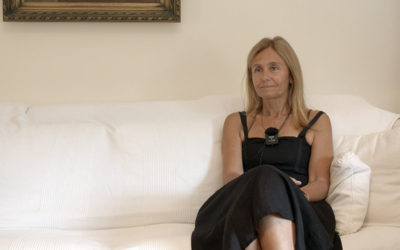
Quote
I never hid it [that I was Jewish], I never felt I had to hide it. […] I remember, […] that our friends from the Jewish school and the [Jewish] club […] joined up with our Christian friends from high school. And they had become a very nice crowd that respected each other’s holidays. And because my brother was coming of age in the 2nd high school, our Christian friends were invited to come to the synagogue and they came in contact with our religion.
Info Fields
Last Name: Mizan
First Name: Anna
Date of Interview: 8/10/2021
Place of Interview: Athens
Project Contributors: Eleni Kouki / Dimitris Polydoropoulos
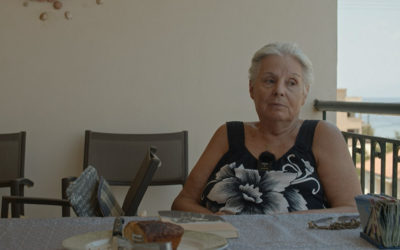
Short Bio
Veta Bati was born in Thessaloniki in 1943. Her mother died in childbirth and her father was arrested shortly afterwards and deported to Auschwitz from where he never returned. In the interview she talks about how she discovered the true story of her birth, about the joys of her childhood and adulthood, but also about her fears and the prejudices she has encountered.
Quote
So often, so often. I have heard a lot of comments like that. And from various people. […] I was young, I was still living in Athens, many years ago. […] And there’s this mother with a crying child in Omonia. And she says to him: “Be quiet or the Jew will take you.” Something struck me, leaving me dizzy. I went up and said to her: “Madam, what are you saying to your child? Which Jews? Have you met any Jews?” […] Let me tell you something else. If I’m out with a group of people, I am looking for a way to get the conversation going and to say that I’m Jewish. Because if someone throws an antisemitic insult, i will explode like a bomb…
Info Fields
Last Name: Bati
First Name: Veta
Date of Interview: 24/7/2021
Place of Interview: Ligia
Project Contributors: Eleni Kouki / Dimitris Polydoropoulos
Short Bio
Makis Batis was born in Ioannina in 1937. He was the second child of Leon and Sophia Batis. On March 25, 1944, while the rest of the family was hiding in Athens, his father was arrested at the Synagogue round up and deported to Auschwitz. In January 1945, as the Red Army approached, Leon managed to escape. He was the first Greek Jew to return and tell what had happened in the camps. In the interview, Makis recounts his childhood memories of the German Occupation and the persecution, and the family’s post-war efforts to rebuild their lives. He tells us about the family business, his numerous social activities, as well as some cases of antisemitism he faced due to these activities.

Quote
During the time we were in hiding, we went through a lot of things. We were very afraid that someone might realise that we were Jews, that the family who rented our house would understand something. […] We were terrified every time the Germans, with their boots, passed outside the fence of the house where we lived. […] Their boots went bam, boom, bam, boom. And we said, now our time is up.
Info Fields
Last Name: Batis
First Name: Makis
Date of Interview: 25/6/2021
Place of Interview: Athens
Project Contributors: Eleni Kouki / Dimitris Polydoropoulos

Short Bio
Nana Moissi was born in February 1944, while her mother Adel Mano was hiding to avoid deportation. The rest of the family were arrested and deported to Auschwitz. Nana spent her childhood years between Athens and Thessaloniki. In her interview she talks about their move to her mother’s hometown, Thessaloniki, and especially the close relationship she developed with her aunt and Auschwitz survivor, Lisa Pinhas, whose memoirs she edited years later. In addition, he shares a verbal antsemitic attack she encountered, while volunteering at Amnesty International.
Quote
Someone from my group [at the Amnesty International] came and attacked me with very scathing words, as if I, a Jew, was to blame for the massacre in Lebanon [in 1982]. I was stunned. And I wrote a letter to the board of Amnesty International to tell them I’m resigning because I’m in the wrong organization: “Where is the respect for human rights regardless of skin, colour or religion? Here, because I am a Greek Jew, I was attacked out of the blue without being guilty of anything.” Pavlos Zannas took the letter, he was the President [of the Greek Department of AI] back then, and he sent Chronis Missios […] – Chronis was in my group – to apologise to me on behalf of the Board, to say that this woman had been thrown out of the Amnesty International and to ask me to withdraw my resignation. And not only that, but I was to be on the Greek delegation to the international conference that same year that took place in Rimini, Italy.
Info Fields
Last Name: Moissi
First Name: Nana
Date of Interview: 2/8/2021
Place of Interview: Athens
Project Contributors: Eleni Kouki / Dimitris Polydoropoulos
Short Bio
Anna Negrin was born in Ioannina in 1950, the first daughter of Naum, an Auschwitz survivor. In the interview, Anna describes how she gradually began to investigate the trauma of the Holocaust and its effects on her generation and her participation in the creation of the association of the second generation of Holocaust survivors. She also shares with us an incident of antisemitism she experienced in the 1980s.

Quote
What I remember [from Ioannina in my childhood] was that […] the people around used to say “Stay inside on Good Friday”. But my mom [who was from Volos] had a lot of Christian friends. All her friends, she said, in Volos were Christians, girls of course. And she said, “Okay, we’re going to see the Epitaphios [procession].” […] Or, on Good Friday in Ioannina, small lambs used to be sold at the street markets, and my mother used to say: “Let’s go and see the lambs.”
Info Fields
Last Name: Negrin
First Name: Anna
Date of Interview: 24/6/2021
Place of Interview: Athens
Project Contributors: Eleni Kouki / Dimitris Polydoropoulos

Short Bio
Sabethai Semos was born in 1929 in Athens. In the interview he recounts the years of the German Occupation, the efforts of his family to hide, and remembers the arrest of his father and brother after a betrayal.
Quote
When my father heard the shooting, he came out [from where he was hiding] and followed the escort to the [police] station. There they called [the police department] in Egaleo, and Egaleo in the Kommandatur, and they said “yes, they are our agents”. So, when this was established, the agents said, “Catch the Jew. If you do not catch him, you are responsible.” […] When my brother realised that Dad was late, he went to see what was going on. When he went there, as I was told, our father made a sign with his eye, “Go!” He didn’t understand. And they caught my brother too. I never saw them again. […] Why did he betray us? Because, who knows who persuaded him that the Germans would win the war, to be in a good position he became a German agent. The baker became a German agent. And he betrayed us. The one who had found us a house [to hide in].
Info Fields
Last Name: Semos
First Name: Sabethai
Date of Interview: 9/9/2021
Place of Interview: Athens
Project Contributors: Eleni Kouki / Dimitris Polydoropoulos
Short Bio
Alexandros Simha was born in Kavala in 1937. In the interview he talks about how his family managed to hide in Athens throughout the war and shares his traumatic experiences as a hidden child who was forced to leave his family for a long time. He also describes the prejudices against the Jews that he personally experienced after the war, but also his father’s struggle for the financial recovery of their family.

Quote
I remember this like it was yesterday. My mother dressed us up in our best clothes and we went [to court]. And my mother told the presiding judge about the problem [that she had with the landlord, who after the liberation did not let them enter the house even though they had paid the rent in advance]. And for the first time I heard them say good things about the Jews. This presiding judge was a ray of hope and joy. He said to the landlord… “Are you not ashamed, these people in their misery, the Germans were hunting them for no reason, and you took advantage of them to sell your house twice?”
Info Fields
Last Name: Simha
First Name: Alexander
Date of Interview: 14/7/2021
Place of Interview: Athens
Project Contributors: Eleni Kouki / Dimitris Polydoropoulos
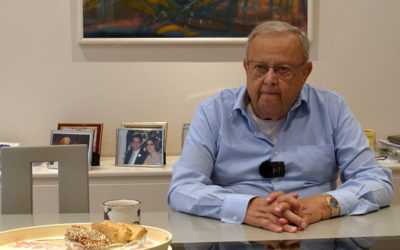
Short Bio
Linos Soussis was born in Corfu in 1947. His mother, Perla was an Auschwitz survivor. In the interview he describes postwar life on the island and reflects on the causes that perpetuate stereotypes and racism.
Quote
There’s a nine-year difference between my younger brother and I. That is, when my brother was five years old, I was 14, and I hugged him. And he was the family mascot. […] And the thought that someone could take my brother drove me crazy. And my mother told me that when she arrived in Auschwitz the first night, she was holding her little brother by her hand. […] The Austrian [guard] noticed that she insisted on staying with the child, and he grabbed her by the hair and said: “if you leave [the line of adults] again, I’ll shoot you.” And she lost her little brother. When she told me that, I was mad, I was in despair.
Info Fields
Last Name: Soussis
First Name: Linos
Date of Interview: 10/10/2021
Place of Interview: Corfu
Project Contributors: Eleni Kouki / Dimitris Polydoropoulos
Short Bio
Lisa Fis-Matathia was born in Corfu in 1946, the first child of Gershom and Stella Matathia, both Auschwitz survivors. In the interview she tells us about her childhood, when even most of the survivors lived together in the old Jewish school until they managed to settle in their own homes. She tells us about the problems of recovery, the burden of the Holocaust and the remembrance of the dead within her family. She also shares some anti-Semitic incidents that happened to her, especially in the 1980s.
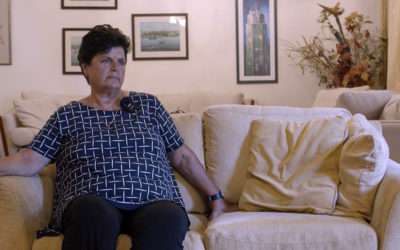
Quote
It took them many years to recover. In Corfu, those who returned had been in the camps; there were not many who had hidden and escaped. And they all gathered in our house, and remembered the stories from the camps… […] Listening to those stories left me in pain.
Info Fields
Last Name: Fis-Matathia
First Name: Liza
Date of Interview: 28/9/2021
Place of Interview: Larissa
Project Contributors: Eleni Kouki / Dimitris Polydoropoulos
 © 2022. This work is licensed under a CC NC SA 4.0 license.
© 2022. This work is licensed under a CC NC SA 4.0 license.

